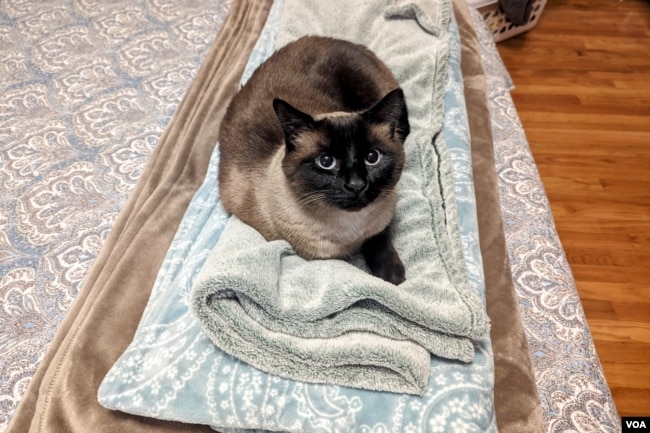People around the world have many kinds of pets. Common pets include cats and dogs. Less common pets might include snakes and guinea pigs.
Pets differ not only by what kind of animal they are, but by their breed, size, color, behavior, age and where they came from.
In today’s Everyday Grammar, we will consider how to describe pets by using adjectives and learn a little about the order of adjectives modifying a noun.
Descriptive adjectives for pets
It is easiest to describe a pet’s physical appearance. You can describe its color, size and shape. You can describe details like the feel of its fur or scales!
You can also describe your pet’s age. Age can be described in detail by days, weeks, months or years. You can also describe your pet’s age generally by using adjectives like young, old, adult or senior.
And lastly you can describe your pet’s behavior and personality with “opinion” adjectives. Opinion adjectives describe what we think or feel about something. Adjectives like “beautiful,” “smart” and “funny” are all opinion adjectives.
Category and order of adjectives
Opinion adjectives are just one category of adjectives. There are many different categories. What some English learners might not know is the order of these categories is important when two or more adjectives from different categories are used to describe a noun.
The order of the adjective categories is as follows:
1. Quantity: Quantity adjectives describe the amount of something.
2. Opinion: Opinion adjectives describe what someone thinks about something — that person’s opinion.
3. Size: Size adjectives describe how big or small something is.
4. Age: Age adjectives are used to describe the age of something. You can use specific numbers or more general words. Sometimes American English speakers put age adjectives before opinion adjectives.
5. Shape or Length: These adjectives describe the form and size of something. You can use specific shapes like a triangle or square or length words like long or short.
6. Color: Color is a great way to describe animals, as they come in many different colors.
7. Origin: These adjectives describe where something or someone came from. For pets, “breed” is a common term used to describe origin.
8. Material: These adjectives describe the substance that things are made of. Often these adjectives come from the nouns they describe.
9. Purpose: Purpose adjectives are just that. They describe purpose or how something works.
Description of a pet
Let’s describe my cat, Sooty Chai, and see what category of adjectives I use:
Sooty Chai is a large, four-year-old Siamese cat. He has big, blue eyes. He also has a cute little white spot on his belly.

In the first sentence, we have the adjectives “large,” “four-year-old” and “Siamese.”
“Large” is in the size category. It comes before “four-year-old” which describes his age. And lastly, we have “Siamese.” “Siamese” is a breed of cat and describes its origin. Siamese cats are believed to have come from the country of “Siam.” Today, English speakers call it Thailand!
In the second sentence, there are the adjectives “big” and “blue” to describe his eyes. Size adjectives come before color adjectives.
And in the last sentence, we have the opinion adjective “cute” that comes before the size adjective “little.” And “little” comes before the color adjective of “white.”
Final thoughts
Today we looked at how we can describe our pets and the order of the adjectives we use to describe them. You can use adjectives for size, shape or color to describe their appearance.
You also can use age and opinion adjectives in either order in American English. Lastly, if you know your animal’s breed or where they are from, you can use “origin” adjectives to describe them.
Now it is your turn. Using the order of adjectives, describe your pet. Share your description in an email to learningenglish@voanews.com.
I’m Faith Pirlo.
Faith Pirlo wrote this lesson for VOA Learning English.
____________________________________________
Words in This Story
guinea pig – n. a small furry animal, or rodent, that is often kept as a pet
breed – n. a kind of animal that is different from others of the same species because of its parents
fur – n. the hairy coat of an animal especially when it is soft and thick
scale – n. small, hard structures that cover the body of most fish, reptiles, and some other animals
origin – n. the place that a person or thing comes from
cute – adj. having a pleasing, youthful appearance
